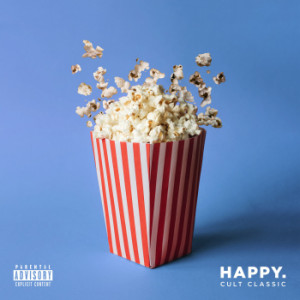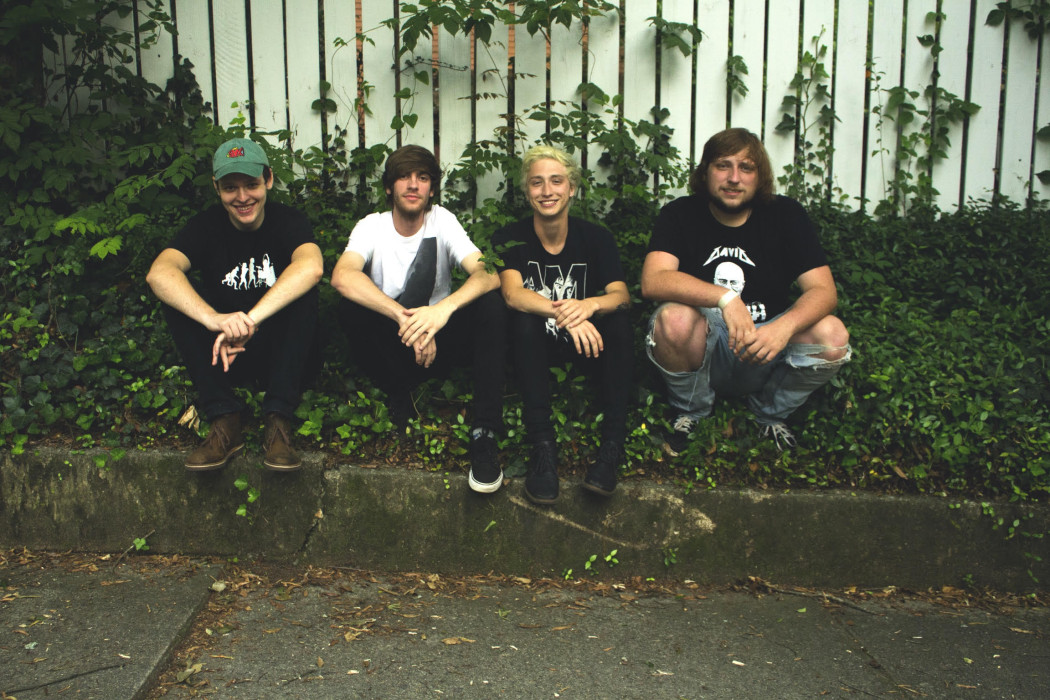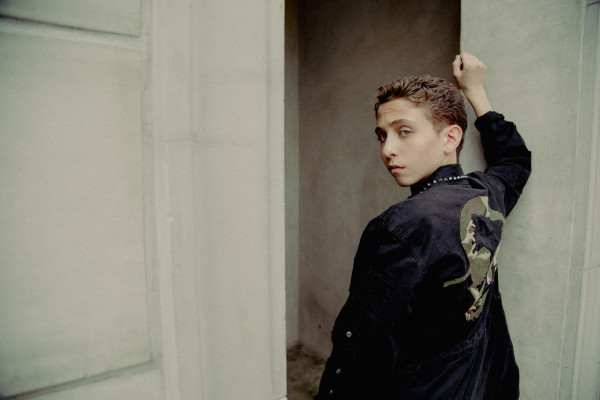Soundtracks define eras more than we often give them credit for. And because of this, some genres can feel like they closely resonate with different decades and social groups. Like how pop-punk has always felt like a symbol for youth angst and rebellion even as it reached the mainstream and became the sound for almost any teen comedy or drama because the sound represented coming of age and figuring life out.
And here’s where we have a band called Happy. Consisting of four members, the South Carolina band includes Tate providing vocals and rhythm guitar, Jack as the lead guitarist, Caleb on drums, and Sean playing bass. Currently preparing to go on tour with the band Brigades, Happy just recently released their debut album, a 10-track project titled Cult Classic.
“Cult Classic is fun and loud, but also honest and vulnerable. It’s about the ups and downs of figuring out who you are and what you want and how the shift from adolescence to adulthood can make you long for the nostalgia of a simpler time,” Tate explains about the arc of the band’s debut album. “But you slowly learn through experiences that you can achieve self-defined happiness along the way, by setting your own goals, determining your own success, and working hard–but that there will always be something special about the memories of your youth.”
Nostalgia is apparent through the band’s lyrics such as in their almost-ballad “Wonder” about coming to the realization that the happiness you used to have is no longer there. But it’s also apparent in their sound which is inspired predominantly by the pop-punk bands they grew up listening to and the bands those bands were also influenced by. So, it makes sense that their first body of work would carry the theme of celebrating nostalgia through a contradicting lens of disillusionment and self-deprecation, “We have a very keen interest in nostalgia and revisiting things that made us feel a certain way at a certain time. Whether it be music, or a person, or a movie, or a clothing item, we love incorporating that into our vision as Happy. We take influence from all different genres and time periods and put a blanket of punk over it.”
“We explored many different types of nostalgia in our music videos as well,” Tate explains mentioning the music videos for the singles of the album “For Don’t Overdose and Drive,” “Winona Ryder,” and “For I Call Shotgun” which included Chuck E. Cheese, the 70s and 80s horror slasher flicks, and Saved By the Bell respectively. All of these are themes and concepts that Tate shares the bands plans to continue exploring.
“I’m a sucker for a good cult classic movie. That phrase is a heavy part of my vocabulary when it comes to discussing my favorite types of movies, tv shows, music albums, etc. It just felt natural to take that concept and expand on it and delve into what it really means to be a ‘Cult Classic,'” Tate talks further about the band’s approach to this album. “We had a record written that had early 2000’s vibes overall, but with 50’s, 60’s, 70’s, and 90’s influences sprinkled in as well.”
[Cult Classic is] about the ups and downs of figuring out who you are and what you want and how the shift from adolescence to adulthood can make you long for nostalgia of a simpler time.
 Their album carries on this aesthetic with a light blue background and an old-school movie popcorn carton that has some popcorn kernels popping out from the top. “We also wanted the visual representation of the album to be full of nostalgia too and to explore different pop culture classics. The name seemed fitting for our debut to give people an idea of what we will have to offer in the future,” Tate says excited about what they hope to bring to the table.
Their album carries on this aesthetic with a light blue background and an old-school movie popcorn carton that has some popcorn kernels popping out from the top. “We also wanted the visual representation of the album to be full of nostalgia too and to explore different pop culture classics. The name seemed fitting for our debut to give people an idea of what we will have to offer in the future,” Tate says excited about what they hope to bring to the table.
“We noticed at the end of the writing process that the record had an overarching theme of self-growth and self-love,” he begins when asked about the most surprising theme or emotion when crafting this album. He continues, “Even though some of the tracks start out with turmoil and self-deprecation, we tried to flip the script in their individual stories to show how you can come out on top of any situation and better yourself along the way. Our message is to find self-defined happiness and not compare yourselves to other’s successes and failures.”
Tate continues about the importance of focusing on yourself and your own emotions, goals, and happiness along with understanding where you are mentally, physically, and emotionally.
In a lot of ways, this thinking is very evident in their body of work. But more specifically, Tate admits that the band chose the singles that they did intentionally because of which ones held the most important messages. “‘Don’t Overdose and Drive’ is about the loss of a friendship due to the person becoming too involved with drugs,” he reveals. “Sometimes you do everything you can for a person, but it’s important to know when you have to step away for the safety of your own well being and life.”
He cites their song “Fishtank” as well, explaining that it’s a song about being in a toxic relationship without realizing it. “Sometimes you have to listen to the people around you that love you and know you best to be able to objectively deal with a situation,” he explains.
Another song on the album is named after Winona Ryder. Discussing the Manic Pixie Dream Girl trope, the song tackles the action of guys romanticizing girls to the point of dehumanizing them and expecting them to exist for their benefit. “The idea of a Manic Pixie Dream Girl originated in movie scripts and books to depict a girl who comes in and saves the boy from all of his bad habits and tendencies, ‘fixes him,’ if you will,” Tate expands on the description.
“This concept has always been very toxic to me. It made its way into society with real-life relationship expectations. I don’t believe it is someone else’s responsibility to do that. I think it’s very important to take care of yourself and learn to love yourself before you embark on loving someone else.” He notes that part of having a healthy relationship is trying to avoid one-sided behaviors and instead, learning give-and-take.
As for the decision to name the song after Winona Ryder, Tate admits that it’s because when he was younger, he placed that title onto her and romanticized her in that way. “She was my ‘Manic Pixie Dream Girl,'” he says frankly, adding, “It was just a personal representation of the concept I am hoping to dismantle.”
Our message is to find self-defined happiness and not compare yourselves to other’s successes and failures.
Moving on to their sound and working as a band making music that’s classified as pop-punk and (as noted earlier in this interview) nostalgia-driven, Tate shares that it’s significant to note the sub-divisions of pop-punk and how that’s played a role in the evolution of the genre and where they stand as a band inside of it.
“Pop-punk has catered towards a more aggressive sound recently with bands such as Neck Deep and Knuckle Puck exploding into the scene. As much as we dig this style, it’s just not what we sound like really at all,” he says. “We grew up listening to bands that were more neon pop punk and you don’t find too much of that sort of sound relevant right now. We aim to bridge that 2000’s style pop punk into a fresh and new environment by incorporating both new and old influences from genres entirely outside of the pop-punk realm.”
When discussing if the pop-punk genre might be creeping into the mainstream soon in the same way that it was in the 90s and early 00’s, Tate notes that it’s possible, but regardless what genres are or aren’t mainstream at the time, what is currently being offered in pop-punk matters. “There is something indescribably special about the intimacy of the genre right now that shouldn’t be taken for granted,” he shares.
“The pop-punk genre has made a lot of progress, but could still use a lot of work regarding the inclusions of women, people of color, and the LGBT community. We wanted our debut album to reflect that we as a genre need to be more accepting and inclusive of everyone,” Tate notes when I ask about how he thinks this genre of music can hold the space for self-reflection. “The songs and lyrics are still very fun and can be light-hearted and whimsical, but we want to make a difference with our actions in the scene.”
Tate explains that the band decides their actions and their intentions with their work based on a self-awareness they have that although the fans of pop-punk are diverse in race, gender, sexuality, etc., the usual “face” of pop-punk is not as much. “We want to encourage our listeners to find the best parts of themselves and what makes them different from the crowd and embrace and love that part. Any and everyone is welcome to our shows, as long as they respect the people around them. We want to create a fan base that is full of support and care, all while having a good time.”
“We have only been a band for a little over a year and a half. When we came together we really took the idea and vision we had and hit the ground running and haven’t slowed down since. We met so many amazing people along the journey, and have grown from learning from their experiences and taking advice,” Tate discusses Happy’s journey thus far.
Creating Cult Classic, the band worked with Will Pugh (Cartel) and Cameron Boucher (Sorority Noise) and got the opportunity to learn a lot from their experiences. “We started out writing music in a basement and formulating a vision and had to learn the best ways to express our message to people in a community,” Tate reflects musing that the answer to how they’ve grown is ever-changing without a direct route.
We wanted our debut album to reflect that we as a genre need to be more accepting and inclusive of everyone.
The band’s music, message, and dynamic, can also be seen through their merch which they credit their record label’s support for helping make the concepts come into fruition, “They pitched a lot of the merch ideas, and we were thrilled with the concept. It was their idea to do the ‘Nirvana Rip-Off’ shirt, which we thought was a great nod to the ‘Cult Classic’ idea as a whole. We also love that we were able to print Cult Classic on vinyl, cassettes, and CD’s because it covered all the ‘classic’ mediums for music in the past.”
Aside from Nirvana, Happy also takes influences from a range of artists like Blink 182, Paramore, Black Sabbath, Sheryl Crow, Turnover, Simon & Garfunkle, The Wallflowers, Fiona Apple, All Time Low, Cartel, Mayday Parade and more. With all of the members taking different inspirations from these different artists, their writing process and the way they approach a song gets to vary.
The band also looks to experiences, both personal and from those they know, for their songwriting. One example is “Where the Wild Things Were” which is based on Tate’s brother. “The story he told me was so interesting and climactic that I was immediately drawn to write a song about it,” Tate gives insight to the song. “This makes songwriting exciting and refreshing to us because every day brings a new opportunity for a story or experience to happen that sparks a song idea.”
“Most of our songs have an upbeat and exuberant vibe to them but focus on heavier or darker topics in the lyrics.” As one of their merch designs read, listeners can get sad to a band called Happy–a juxtaposing slogan that was made to show their music’s irony.
Closing out our interview, Tate assures that Happy is looking forward to touring, “special shows,” and writing new music in the upcoming year. He also sends a final affirming message to the fans reading this:
“Growing up as a fan, personal connections with the artists and musicians that I loved always gave a lasting impression to me and made me a fan for life. We hope to always give that same reciprocation back to fans. Without them, we wouldn’t be able to do what we are doing. We will always do our best to keep the conversation open with our fans and make them feel welcome, accepted, loved, and appreciated. We are so thankful for their time and energy and we are always thrilled to meet them and interact with them. Our music is about creating friendships and connections with people you may not have realized you had anything in common with before. We want our fans to know that they are welcome in our community and are encouraged to be 100% themselves and to love the things about themselves that make them different and unique. If you love yourself for you, other people will love you for you.”
~~~
You can stay up to date on all things Happy. by following their Facebook, Twitter, and Instagram accounts.
Their debut album ‘Cult Classic’ is available now wherever you get music.
(photo cred: TBA)




